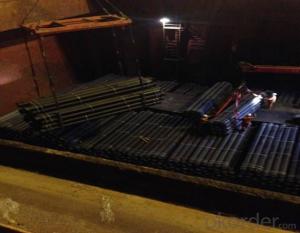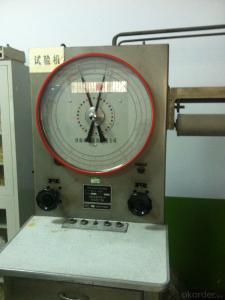DUCTILE IRON PIPE AND PIPE FITTINGS K8 CLASS DN200
- Loading Port:
- Tianjin
- Payment Terms:
- TT OR LC
- Min Order Qty:
- 23 pc
- Supply Capability:
- 3000 pc/month
OKorder Service Pledge
OKorder Financial Service
You Might Also Like
Material : Ductile Cast Iron
Size Range : DN 80mm to DN 2000mm
Unit Effective Length : 6m or 5.7m
Manufacture Standard: ISO 2531:1998/ EN 545:2006/EN 598:2007
Annual capacity : 200,000 tons
Coating Exterior: Zinc 130g/m2 according to ISO 8179-1 and bitumen coating 70 microns.
Cement Interior: Portland Cement/ High Alumina Cement/ Sulphate Resisting Cement Lining according to ISO 4179
Special requirements on external coating and internal lining can be applied
We also provide accessories such as SBR/EPDM rubber gaskets, lubricant paste, pipe caps, PE sleeves, etc.
Additional Parts:
Each pipe is strictly inspected according to related standard to ensure permanently high performance.
Easy Installation at site and service free for life
Long Service Lifespan
Quotation will arrive you within 24hours once we get your inquiry.
We guarantee offering you a competitive price.
A copy of original inspection reports of pipes will be offered after shipment.
Photos of loading process will be sent to the customer after shipment effect.
We will follow-up the delivery progress after shipment effect and update to the customer on weekly basis.
- Q:Can ductile iron pipes be used for underground irrigation systems?
- Indeed, underground irrigation systems can utilize ductile iron pipes. These pipes find extensive use in a multitude of applications, such as water supply and distribution systems. Renowned for their robustness, durability, and resistance to corrosion, ductile iron pipes prove ideal for subterranean installations. Moreover, they possess exceptional pressure-bearing capabilities, enabling them to endure the elevated pressures commonly associated with irrigation systems. Nevertheless, it remains crucial to guarantee appropriate installation and maintenance to avert any potential harm or leakage within the system.
- Q:Are ductile iron pipes suitable for road crossings?
- Indeed, road crossings can indeed be suitably accommodated by ductile iron pipes. Given its robustness and durability, ductile iron proves to be exceedingly appropriate for subterranean installations, specifically road crossings. These pipes exhibit remarkable tensile strength, enabling them to endure substantial loads and traffic pressures without succumbing to fractures or breakages. Moreover, ductile iron pipes showcase exceptional resistance to corrosion, guaranteeing their durability even in the harshest of environments. Not to mention, their effortless installation and upkeep render them a dependable option for road crossings.
- Q:Are ductile iron pipes suitable for use in wastewater treatment plants?
- Yes, ductile iron pipes are suitable for use in wastewater treatment plants. Ductile iron is a strong and durable material that can withstand the harsh and corrosive environment present in wastewater treatment plants. It has excellent resistance to abrasion, corrosion, and chemical attacks, making it a reliable choice for conveying wastewater and handling the various chemicals and substances found in the treatment process. Ductile iron pipes also have high tensile strength, which allows them to withstand high-pressure conditions and the weight of the surrounding soil. Additionally, ductile iron pipes are known for their flexibility, which makes them resistant to ground movement and settlement, ensuring long-term performance and reliability in wastewater treatment plants.
- Q:How can the ductile iron pipe depress the elbow so as to prevent it from being opened?
- The way to connect with the pipe is: direct welding (the most commonly used way), flange connection, hot melt connection, electric melting connection, threaded connection and socket connection. According to the production process can be divided into: welding elbow, stamping elbow, push elbow, casting elbow, etc..
- Q:What are the different methods for restraining ductile iron pipe?
- There exist various techniques for restraining ductile iron pipe to prevent any movement or displacement caused by internal pressure, external forces, or ground movement. The most commonly used approaches include: 1. Thrust blocks: Concrete blocks or structures are positioned at bends, tees, or other directional changes in the pipe. These blocks are designed to resist the forces exerted by flowing water or fluids within the pipe, effectively anchoring it in place. 2. Mechanical restraints: Harnesses or clamps are installed around the pipe and affixed to a fixed structure, such as a wall or concrete anchor. These restraints provide a physical barrier that prevents any movement or shifting of the pipe. 3. Pipe restraints: Devices directly attached to the pipe and anchored to a fixed structure, such as pipe clamps, restraints, or saddles. They are designed to securely hold the pipe in place and resist any movement or displacement. 4. Proper pipe bedding and backfill: It is crucial to properly support and surround the pipe with compacted material to prevent any movement or shifting. This method involves carefully placing and compacting soil or suitable materials around the pipe to provide stability and prevent displacement. 5. Trench walls: The walls of the trench where the ductile iron pipe is installed can also contribute to restraining it. By correctly compacting the soil against the pipe and ensuring proper stability of the trench walls, the pipe can be effectively restrained and prevented from moving. Overall, the various methods for restraining ductile iron pipe aim to ensure its secure placement without any displacement or movement. The choice of method depends on factors such as location, application, and the forces acting on the pipe. It is important to consult with engineers and adhere to industry guidelines and standards to determine the most appropriate method for restraining ductile iron pipe in specific situations.
- Q:Can ductile iron pipe be used for water supply to remote areas?
- Ductile iron pipe is indeed applicable for providing water supply to far-flung regions. Its exceptional strength and durability render it suitable for transmitting water over long distances. These pipes can endure high pressure and withstand external loads and impacts, making them an ideal choice for rough terrains and remote locations that pose challenges in terms of maintenance and repairs. Moreover, ductile iron pipes are equipped with a protective lining that prevents corrosion and guarantees the safety of the water for consumption. Consequently, ductile iron pipes prove to be an effective and dependable option for water supply to remote areas.
- Q:What is the typical lifespan of ductile iron pipes?
- The typical lifespan of ductile iron pipes can vary depending on various factors such as the quality of the pipes, the environmental conditions, and the maintenance practices. However, on average, ductile iron pipes have a lifespan of around 75 to 100 years. This makes them a durable and long-lasting option for water and sewage transportation systems. With proper installation and regular maintenance, these pipes can withstand corrosion, pressure, and other external factors, ensuring their longevity and reliability. Additionally, advancements in coatings and linings have further enhanced the lifespan of ductile iron pipes, making them an excellent choice for infrastructural projects.
- Q:Are ductile iron pipes suitable for installation in areas with high traffic loads?
- Yes, ductile iron pipes are suitable for installation in areas with high traffic loads. Due to their inherent strength and durability, ductile iron pipes can withstand heavy loads and are commonly used in applications where there is significant vehicular traffic.
- Q:What do ductile iron pipes need to connect with three? Can I contact it directly?
- Because the interface material used in the old process is poisonous, especially in the water supply pipeline, environmental protection requires a new process now
- Q:What if the ductile iron pipe is broken?
- Ductile iron pipes can be broken with a large piece of repair sectionIn the medium and low pressure pipe network, nodular cast iron pipe has the advantages of safe operation, low breakage rate, convenient construction and maintenance, excellent corrosion resistance, etc..
1. Manufacturer Overview |
|
|---|---|
| Location | |
| Year Established | |
| Annual Output Value | |
| Main Markets | |
| Company Certifications | |
2. Manufacturer Certificates |
|
|---|---|
| a) Certification Name | |
| Range | |
| Reference | |
| Validity Period | |
3. Manufacturer Capability |
|
|---|---|
| a)Trade Capacity | |
| Nearest Port | |
| Export Percentage | |
| No.of Employees in Trade Department | |
| Language Spoken: | |
| b)Factory Information | |
| Factory Size: | |
| No. of Production Lines | |
| Contract Manufacturing | |
| Product Price Range | |
Send your message to us
DUCTILE IRON PIPE AND PIPE FITTINGS K8 CLASS DN200
- Loading Port:
- Tianjin
- Payment Terms:
- TT OR LC
- Min Order Qty:
- 23 pc
- Supply Capability:
- 3000 pc/month
OKorder Service Pledge
OKorder Financial Service
Similar products
New products
Hot products
Related keywords



























